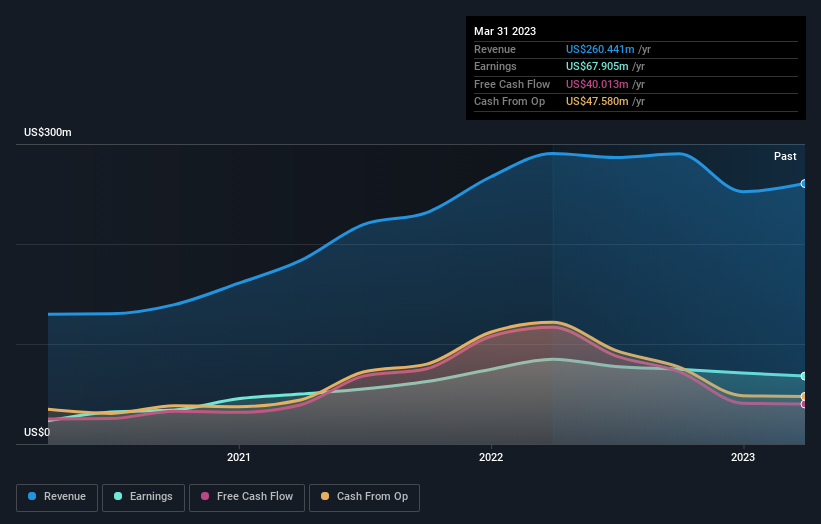With 86% ownership, The St. Joe Company (NYSE:JOE) boasts of strong institutional backing
Key Insights
Given the large stake in the stock by institutions, St. Joe's stock price might be vulnerable to their trading decisions
A total of 3 investors have a majority stake in the company with 57% ownership
A look at the shareholders of The St. Joe Company ( NYSE:JOE ) can tell us which group is most powerful. And the group that holds the biggest piece of the pie are institutions with 86% ownership. That is, the group stands to benefit the most if the stock rises (or lose the most if there is a downturn).
Given the vast amount of money and research capacities at their disposal, institutional ownership tends to carry a lot of weight, especially with individual investors. Therefore, a good portion of institutional money invested in the company is usually a huge vote of confidence on its future.
Let's take a closer look to see what the different types of shareholders can tell us about St. Joe.
View our latest analysis for St. Joe
What Does The Institutional Ownership Tell Us About St. Joe?
Institutions typically measure themselves against a benchmark when reporting to their own investors, so they often become more enthusiastic about a stock once it's included in a major index. We would expect most companies to have some institutions on the register, especially if they are growing.
We can see that St. Joe does have institutional investors; and they hold a good portion of the company's stock. This suggests some credibility amongst professional investors. But we can't rely on that fact alone since institutions make bad investments sometimes, just like everyone does. If multiple institutions change their view on a stock at the same time, you could see the share price drop fast. It's therefore worth looking at St. Joe's earnings history below. Of course, the future is what really matters.
Since institutional investors own more than half the issued stock, the board will likely have to pay attention to their preferences. St. Joe is not owned by hedge funds. Fairholme Capital Management, L.L.C. is currently the largest shareholder, with 38% of shares outstanding. The second and third largest shareholders are The Vanguard Group, Inc. and BlackRock, Inc., with an equal amount of shares to their name at 9.1%. We do understand that the Chairman of the Board, Bruce Berkowitz, is the Founder and Chief Investment Officer of Fairholme Capital Management, but we will not count this as an insider holding.
After doing some more digging, we found that the top 3 shareholders collectively control more than half of the company's shares, implying that they have considerable power to influence the company's decisions.
While it makes sense to study institutional ownership data for a company, it also makes sense to study analyst sentiments to know which way the wind is blowing. We're not picking up on any analyst coverage of the stock at the moment, so the company is unlikely to be widely held.
Insider Ownership Of St. Joe
The definition of an insider can differ slightly between different countries, but members of the board of directors always count. Management ultimately answers to the board. However, it is not uncommon for managers to be executive board members, especially if they are a founder or the CEO.
Most consider insider ownership a positive because it can indicate the board is well aligned with other shareholders. However, on some occasions too much power is concentrated within this group.
We can see that insiders own shares in The St. Joe Company. It is a pretty big company, so it is generally a positive to see some potentially meaningful alignment. In this case, they own around US$91m worth of shares (at current prices). It is good to see this level of investment by insiders. You can check here to see if those insiders have been buying recently.
General Public Ownership
With a 11% ownership, the general public, mostly comprising of individual investors, have some degree of sway over St. Joe. While this size of ownership may not be enough to sway a policy decision in their favour, they can still make a collective impact on company policies.
Next Steps:
I find it very interesting to look at who exactly owns a company. But to truly gain insight, we need to consider other information, too. Be aware that St. Joe is showing 2 warning signs in our investment analysis , and 1 of those is significant...
Of course this may not be the best stock to buy . Therefore, you may wish to see our free collection of interesting prospects boasting favorable financials.
NB: Figures in this article are calculated using data from the last twelve months, which refer to the 12-month period ending on the last date of the month the financial statement is dated. This may not be consistent with full year annual report figures.
Have feedback on this article? Concerned about the content? Get in touch with us directly. Alternatively, email editorial-team (at) simplywallst.com.
This article by Simply Wall St is general in nature. We provide commentary based on historical data and analyst forecasts only using an unbiased methodology and our articles are not intended to be financial advice. It does not constitute a recommendation to buy or sell any stock, and does not take account of your objectives, or your financial situation. We aim to bring you long-term focused analysis driven by fundamental data. Note that our analysis may not factor in the latest price-sensitive company announcements or qualitative material. Simply Wall St has no position in any stocks mentioned.
Join A Paid User Research Session
You’ll receive a US$30 Amazon Gift card for 1 hour of your time while helping us build better investing tools for the individual investors like yourself. Sign up here


